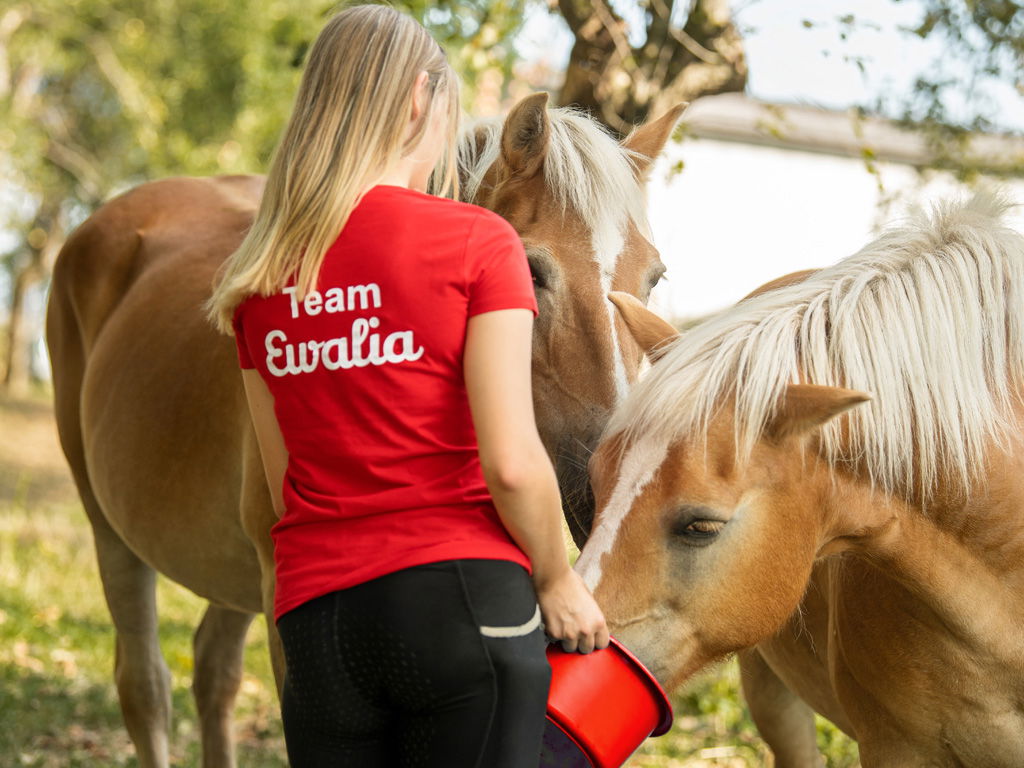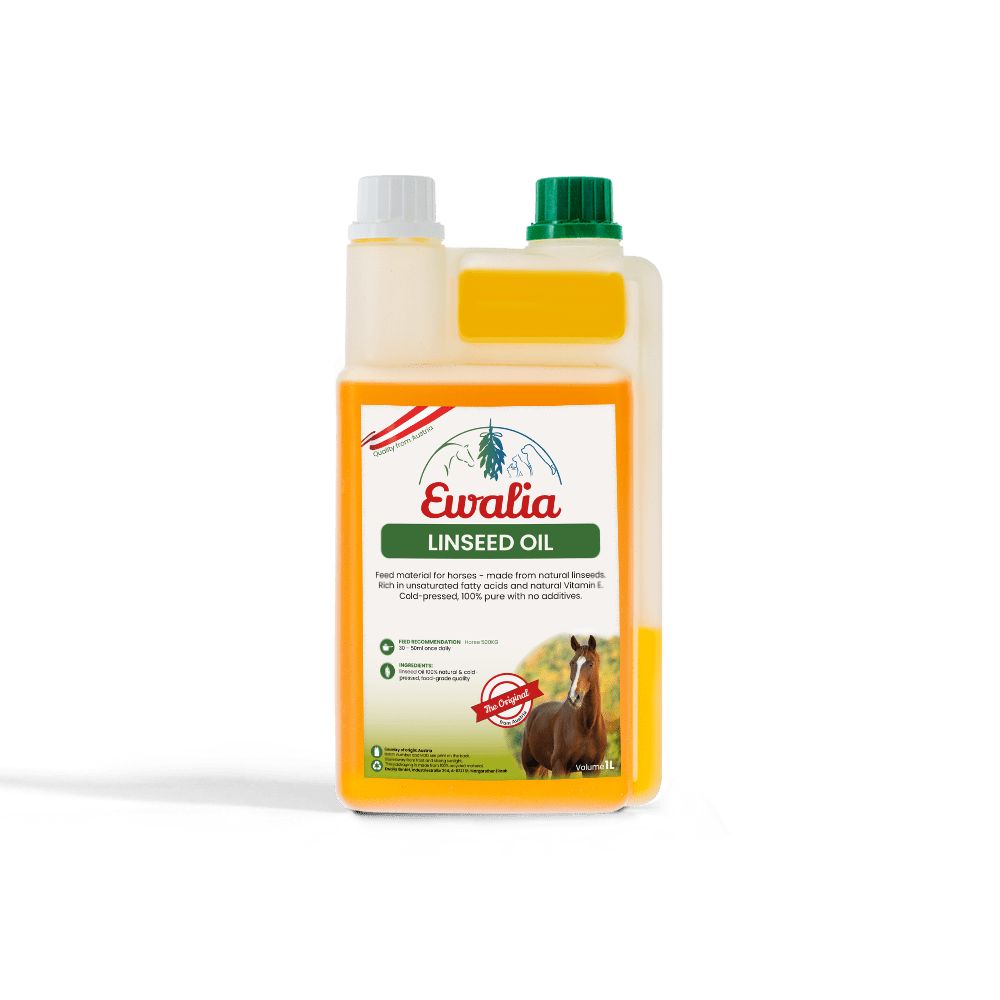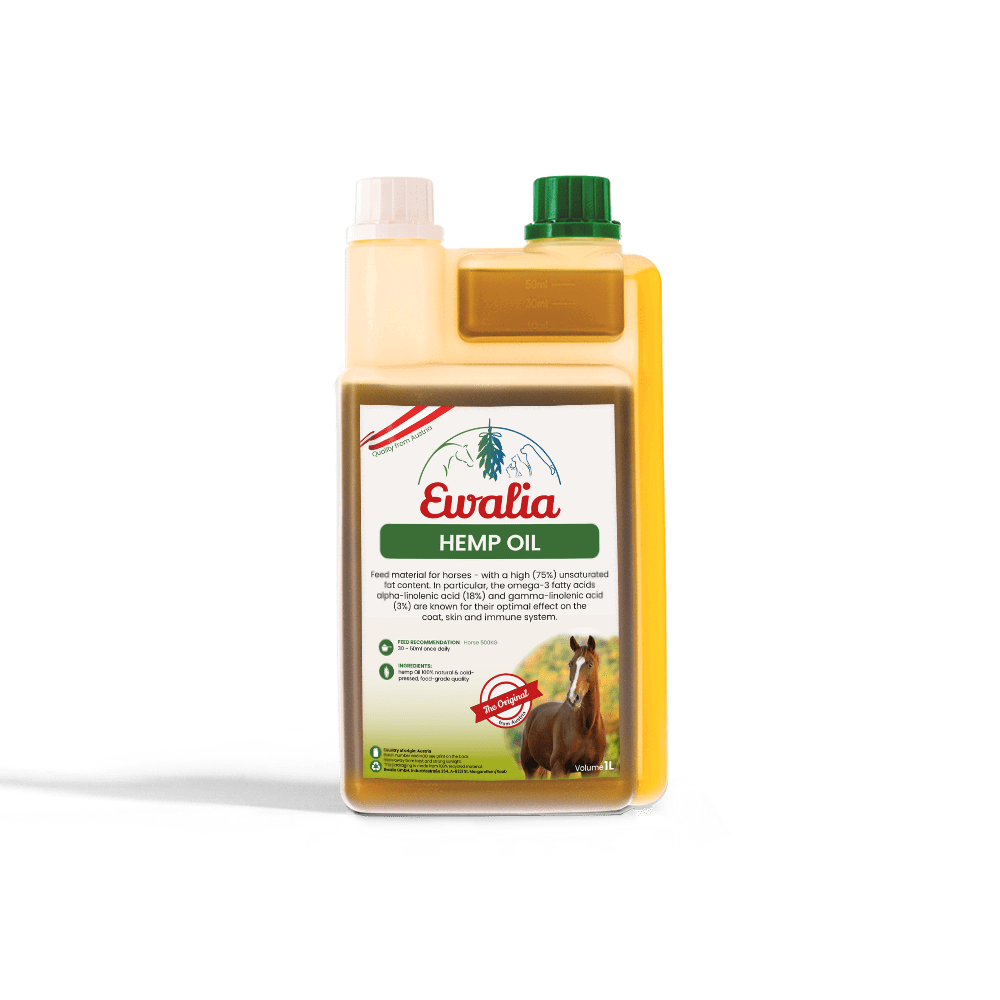The ABCs of vegetable fats and oils

About nutritious vegetable oils in feeds
Have you ever wondered what lies behind all the talk of fats, oils, antioxidants, radical scavengers, saturated and unsaturated fatty acids and what one should know about adding oils to feed? Here you'll find an overview of vegetable fats and oils with a few interesting facts and important tips on feeding your animal oils. More and more horse lovers and dog lovers are learning about the benefits of vegetable oils with high percentages of unsaturated fatty acids.
One of the oldest and most thoroughly researched of these is olive oil. Numerous ancient writings document its use as a nutritional supplement, a cosmetic, and an embalming aid. What makes oils beneficial to human and animal health?
What are vegetable fats?
Fats and fat oils consist of triesters of the triad alcohol glycerol with various, mostly even-numbered, unbranched aliphatic (subgroup of hydrocarbons) monocarboxylic acids (fatty acids). For the general consumer, the following criteria are key:
- One can recognise a high percentage of unsaturated fatty acids if the oil or fat is in a liquid state at room temperature.
- One can recognise a high percentage of saturated fatty acids if the oil or fat is in a solid or semi-solid state at room temperature (for example coconut oil).
The pharmaceutical term fatty oils is used to differentiate them from essential oils, which have other uses. In nutrition science, the term fat is used for triacylglycerols that are solid at room temperature, and the term oil for those that are liquid.
In contrast, waxes are a mixture of esters of higher fatty acids with higher, usually equal long-chain monohydric alcohols. The definition of wax is largely physical, in that it is soft at 20°C and becomes solid or brittle at lower temperatures.
What are fatty acids?
Fatty acids are defined by their chemical structure, i.e., by their chain length and the number of their double bonds of carbon atoms. The proportion of unsaturated fatty acids in vegetable oils is very high (over 80%) in contrast to animal fats.
The difference between saturated and unsaturated fatty acids lies in their chemical structures, primarily in the double bonds of the carbon atoms. Unsaturated fatty acids have at least one or more C=C double bonds, whilst saturated fatty acids have no carbon double bonds. For mammals, the essential unsaturated fatty acids are those which have one or more double bonds at a higher carbon atom position. Here, "essential" means that an organism needs this substance but cannot produce it itself.
These essential fatty acids are needed in the cells for the breaking down of enzymes, the building of cell membranes and the transport of ions. Studies in human medicine have shown that certain unsaturated fatty acids have a significant influence on the immune system and can even influence the ability to learn.
Which are fat-soluble substances?
Fat-soluble substances include waxes, enzymes, beta-Carotene, lecithin, fat-soluble vitamins like A, D, E and K, and various secondary plant substances.
Of particular note here is vitamin E (α-tocopherol), as it is a radical scavenger and plays an important role for the organism. "Radical reactions" are responsible for a variety of inflammatory diseases and degenerative processes involving the skin and, worst case, may be a trigger for carcinoma. An antioxidant, vitamin E can prevent or limit the triggering of radical reactions.
What are antioxidants?
Antioxidants are substances that retard the oxidisation processes and thus the perishability of oils. Lethicin, ascorbic acid (vitamin C) and citric acid are all well-known antioxidants.
How can one improve the shelf-life of oils?
Fats and oils perish mainly from oxidisation. This means that if oils are stored in airtight conditions in a cool, dark place, the antioxidants will be largely preserved and the oil will not turn rancid. Oils with high levels of unsaturated fatty acids (untreated, cold-pressed oils) perish more quickly.
How are vegetable oils and fats produced?
Vegetable fats and oils are obtained from the seeds and fruits of different plant species by mechanical extraction (e.g. a hydraulic screw press) or by solvent extraction. Manufacturers generally aim for maximum yield with good quality and label their products accordingly (e.g. "cold pressed").
Cold pressing will result in a natural, good-quality oil. The seeds and fruits are crushed and ground with appropriate mechanical pressure which should not exceed temperatures between 40 and 60°C. Our valuable vegetable oil comes from this "first" pressing and contains all valuable fat-soluble substances, such as waxes, enzymes, ß-carotene, lecithin, vitamin E, and secondary plant substances.
This is usually followed by a second pressing process with the addition of heat, which can change the colour, smell, and taste of the oil and cause the coagulation of proteins and the precipitation of mucilages. The oil will be thinner but will have lost nutrients and quality.
Extraction / refining
The material predominantly used for solvent extraction today is hexane rather than petrol, benzene, or carbon disulphide as in the past. However, it is difficult to separate the solvent from the oil. New refining processes allow extracted oils to be purified again, but this can change the taste, colour, and odour and therefore reduce quality.
Consumers recognise carefully produced oils of high quality by the terms used in labelling, like "virgin", "cold-pressed" and "unrefined".
Summary: Important tips on oils in feed
Vegetable oils are important for nutritional health, as fats provide the highest energy density (9 kcal/g) of all feeds. But they also supply essential fatty acids and important fat-soluble substances such as vitamins, antioxidants, enzymes etc., which are essential to the organism.
- When feeding to horses, use only cold-pressed, natural vegetable oils! Fish oils can be fed to dogs and cats.
- Alternate between different types of vegetable oil, as their contained substances differ!
- Keep oils stored airtight in a cool, dark place!
- For animals susceptible to being overweight, pay attention to total energy intake!
- Animals with higher energy needs, such as pregnant or lactating mares or bitches, should be fed fatty oils with low amounts of essential oils, as these can lead to negative reactions (diarrhoea, allergy triggers). If fatty vegetable oils are used as pure energy sources, we recommend linseed oil as it is the most easily digestible!
- Keep in mind that some vegetable oils (black cumin oil, for example) can be used in a variety of ways – not only as feed supplements but also to treat minor injuries and skin irritations when applied externally!
- Consult your vet before feeding oil to an animal suffering from a severe gastrointestinal illness.
- Always follow dosage instructions!
Author: Bianca Becker-Slovacek am 19.10.2018
Source: Krist, S., Buchbauer, G., & Klausberger, C. (2008). Lexikon der pflanzlichen Fette und Öle. Wien: Springer Verlag.
















